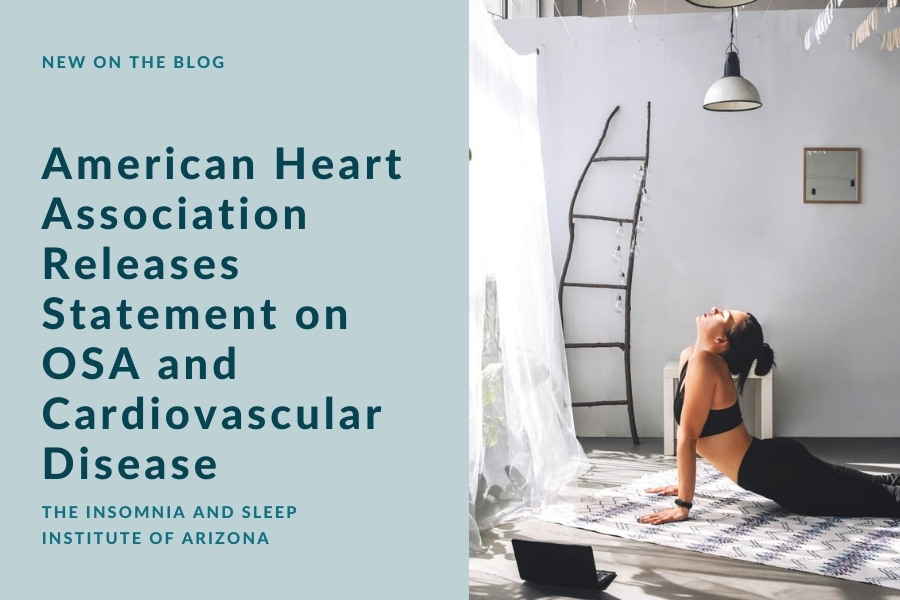American Heart Association (AHA) published a statement on the relationship between obstructive sleep apnea (OSA) and cardiovascular disease in June 2021. The AHA estimates that 34% of middle-aged men and 17% of middle-aged women struggle with OSA (though many are undiagnosed). Of those with hypertension, coronary artery disease, or heart failure, it is estimated that 40 – 80% have OSA. Given these figures, the AHA strongly recommends OSA screening in those with hypertension or poorly controlled hypertension. Both weight loss (when appropriate) and behavioral changes can be helpful in managing OSA, but continuous positive airway pressure (CPAP) remains the gold standard for treating OSA. In the rare instances in which this treatment fails, an implant—such as the Inspire implant—may be appropriate. The Insomnia and Sleep Institute is one of the rare facilities that offers implants for certain OSA patients.
Getting to the Heart of OSA
OSA is the most common form of sleep apnea and one of the top reasons patients initially schedule a consultation with a sleep specialist at The Insomnia and Sleep Institute of Arizona. We are proud to serve you as the “Face of Sleep Medicine” in the Phoenix area, where we set the standard for sleep medicine in the state. Driven by outcomes, we offer unprecedented staffing levels including multiple sleep specialists, two psychologists, a physician assistant with a Masters in Sleep, and teams including respiratory therapists and nurse practitioners trained in sleep medicine.
OSA is marked by recurring upper airway obstruction during sleep. Those who are older and/or overweight are especially at risk of OSA. Certain ethnicities and a family history of sleep apnea are also known risk factors. However, obesity is the most remarkable factor when considering OSA. For example, the AHA notes a study of 690 people in which it was revealed a 10% weight gain was linked to almost a 32% increase in the apnea-hypopnea index. Fortunately, even a conservative amount of weight control was effective in reducing the occurrence of sleep apnea events in these subjects.
Weight gain alone is not the only factor when connecting obesity with OSA. The AHA points to a study that highlighted specifically larger waist and neck circumferences with OSA. A propensity for OSA became prevalent in men with 17+ inch neck circumference and women with 16+ inch neck circumference. This remains true even when considering body mass index (BMI) overall. This may be due to the neck being a critical part of the body for allowing for upper airway flow.
Managing OSA
Managing OSA begins with getting the right diagnosis, which is why every consultation at The Insomnia and Sleep Institute is with a sleep specialist who can diagnose sleep disorders. This is the only way to get to the next steps, such as testing and treatment (if applicable). The AHA stresses that up to 95% of people with “clinically significant” OSA actually had no previous OSA diagnosis. Unfortunately, Black patients are disproportionately under-diagnosed compared to other populations.
OSA has long been associated with many cardiovascular issues ranging from stroke to arrhythmias, metabolic syndrome, and more. OSA and cardiovascular issues are a true comorbidity, with OSA worsening cardiovascular problems while cardiovascular problems simultaneously worsen OSA. Hypertension is especially common in OSA patients, with the AHA stating that 30 – 50% of people with hypertension also suffer from OSA. Those with resistant hypertension are particularly prone to OSA—nearly 80% of these patients have OSA.
Help for OSA
If you have a heart condition and/or suspect you have sleep apnea, help is available. The first step is a correct diagnosis, and when it comes to diagnosing OSA you deserve to have the best sleep specialists taking care of you.
Bear in mind that even though OSA does increase the risk of death caused by a cardiovascular incident, it remains widely underrecognized (and in turn undertreated) within cardiovascular medical practices. Your cardiologist might not recommend an OSA screening, but you can take your well-being into your own hands today. There are options available for living with OSA. Connect with The Insomnia and Sleep Institute by calling the office, or for the fastest appointment simply complete the online form right now.





